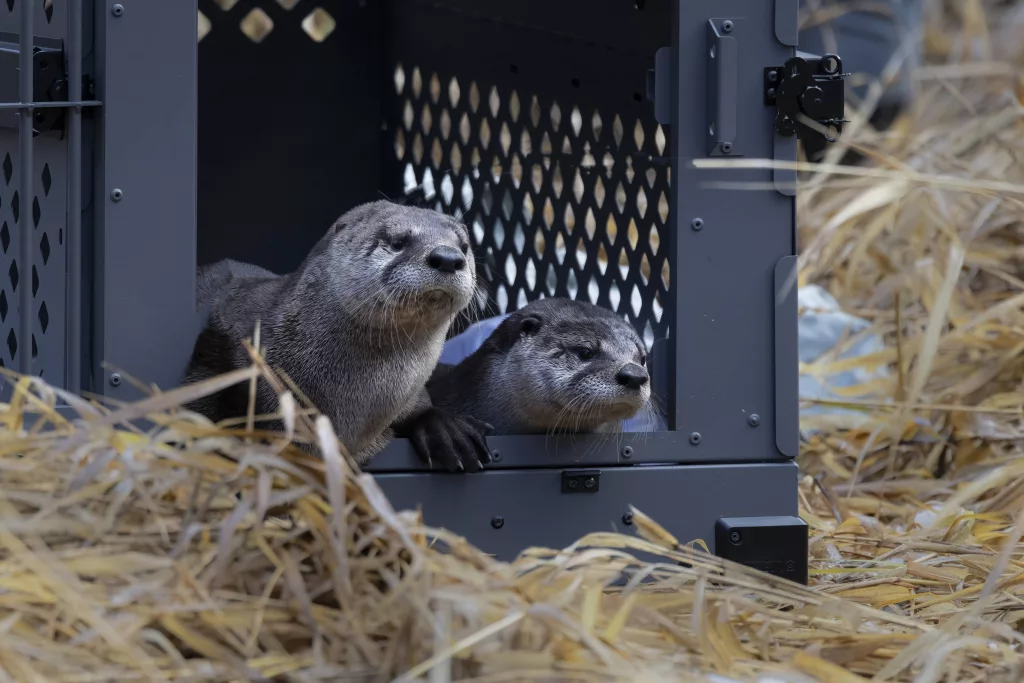Think Wild and Wildlife Center of the North Coast (WCNC) are excited to announce the release of two orphaned North American river otters who were rescued this summer.
The young otter pups were found on June 26 in a roadside ditch by a park ranger in Cove Palisades State Park alone and in critical condition. Their third littermate had already passed away. Think Wild, Central Oregon’s wildlife hospital, rescued and stabilized the two otters for a month and then transferred them to the WCNC for their continued care until ready for release. On November 11, both centers assessed the fitness and health of the pups and determined the time was right to transfer them back to Central Oregon for release this past weekend at a remote location along a tributary of the Deschutes River.
The two otter pups spent five months at the Wildlife Center of the North Coast in Astoria. Their care progressed from otter-specific formula to hunting live prey, with a diet centered on fish and innovative feeding methods designed to prevent human habituation. The otters thrived in a specially designed enclosure featuring diverse terrain, pools, and enrichment activities. After five months of care, the pair reached a healthy weight of approximately 6 kg and were deemed ready for release, having exhibited essential survival skills, including swimming proficiency, hunting behaviors, and social interactions. The otters were transferred from WCNC back to Think Wild in mid-November, and released in appropriate riparian habitat here in Central Oregon over the weekend.
“River otters are highly intelligent and can easily become habituated to humans if proper precautions are not taken,” says Pauline Hice, Think Wild Director of Wildlife Rehabilitation. “Think Wild and the Wildlife Center of the North Coast took extreme measures to ensure the otter pups do not associate humans or their scent with food or safety.”
The otters were released into a carefully selected riparian habitat on private land along a river, where they will receive ongoing support during their transition to independence. Think Wild installed an insulated temporary den and will provide supplemental feedings through a specialized feeding port designed to prevent human habituation. This “soft release” approach, especially important during the winter months, ensures the otters have reliable access to food and shelter while they develop their hunting skills and gradually adapt to their new habitat. “This transition period is crucial for their survival,” says Hice. “By providing this additional support, we’re giving these otters the best possible chance at a successful return to the wild.”
Think Wild is fundraising to build a semi-aquatic mammal rehabilitation enclosure, designed specifically for the long-term rehabilitative care of river otters and beavers for release back to the wild. “The rescue of these river otters and the following collaboration between Think Wild and WCNC highlighted the need for a large, multi-species aquatic mammal enclosure for rehabilitation east of the Cascades,” said Sally Compton, Think Wild Executive Director. “Transferring wild animals back and forth across the state is not an ideal situation for us or the animals, so this facility will provide a much needed resource for orphaned and injured river otters and beavers in Central and Eastern Oregon and beyond.”
While the project has garnered significant community support, the estimated cost of the project will exceed $80,000, reflecting the specialized infrastructure required for these unique species. Think Wild continues to seek donations to help make this vital facility a reality for Central and Eastern Oregon wildlife.
If you would like to support Think Wild’s efforts to build this new rehabilitation enclosure, donations can be made at: https://secure.givelively.org/






